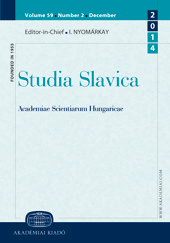Атрибутивная сочетаемость слова годы в свете композиционной и когнитивной семантики
Attributive compatibility of the word years in the light of compositional and cognitive semantics
Author(s): Boris Yustinivich Norman, Anna Plotnikova Subject(s): Theoretical Linguistics, Semantics, Cognitive linguistics, Eastern Slavic Languages
Published by: Akadémiai Kiadó
Keywords: Russian; semantics; temporal nominations; attributive word combinations;
Summary/Abstract: The article focuses on the Russian attributive constructions with the head noun годы (years), which is used to denote decades (двадцатые годы – the twenties, тридцатые годы – the thirties, сороковые годы – the forties, etc.). Periods of time of equal length are perceived subjectively and are evaluated on the basis of the speakers’ individual or collective experience. Being a discreet time model in reality, decades are represented in the language as an indiscreet unit which is attributed a certain quality (революционные двадцатые – the revolutionary twenties, огненные сороковые – the fiery forties, застойные восьмидесятые – the stagnant eighties). Statistical data analysis allows to reveal the most frequent language characteristics of each decade of the Russian history of the 20th century. The phrases examined below metonymically refer not to the periods of time but rather to the events within.
Journal: Studia Slavica Academiae Scientiarum Hungaricae
- Issue Year: 60/2015
- Issue No: 2
- Page Range: 347-359
- Page Count: 13
- Language: Russian
- Content File-PDF

